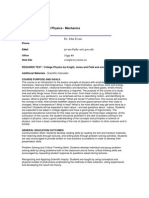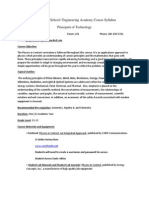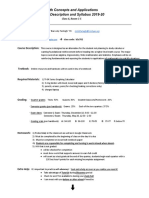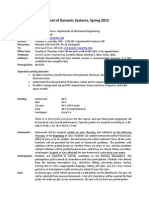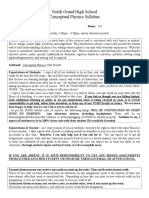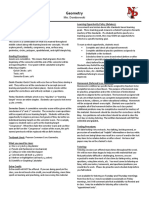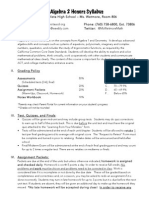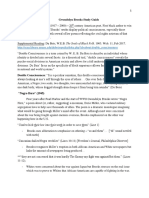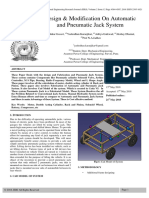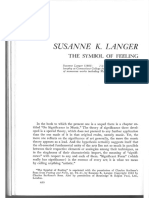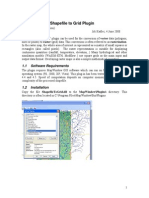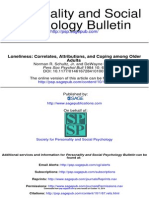Course: Honors Physics
Instructor: Tom Rodgers
Instructor’s Phone: (757) 481-9478, ext. 1391
Classroom: S&T 221
Meeting Time: Bells Two, Six, and Seven
Course Description:
Physics Honors (H) If you’ve ever asked your math teacher “When are we going to use this?” Honors Physics
is your answer! Isaac Newton revolutionized the way human beings understand the universe when he revealed
that many of the most complicated phenomena can be explained with a startlingly short list of relatively simple
equations. When you take Honors Physics, you’ll learn how to discover those equations for yourself – and how
to use them to understand the world around you. You've worked hard to master mathematics; it’s time to put
all of those problem-solving and numerical analysis skills to use!
Prerequisite: Algebra I/, Geometry; Co-Requisite: Algebra II/Trigonometry
Materials:
You should bring the following materials with you to each class:
• pen or pencil
• a graphing, scientific calculator
• a three-ring binder or other notebook
• loose-leaf paper
• two or three pages of grid paper printed from the Downloads area of the course’s web page
There is no textbook required for this course. You will be given a number of handouts with information
which you should keep in your folder so that you can refer to them in class and while doing homework
assignments. There will also be a number of on-line resources made available to you throughout the year.
You are required to takes notes during class discussions and lab activities. You may choose to keep a
spiral-bound notebook, but I strongly recommend that you take notes on loose-leaf paper and keep them in a
binder. This will allow you to combine them with assignments and handouts as the year goes on.
Though any scientific calculator with graphing capabilities is acceptable, all instructions and examples
will be tailored to the TI-83 calculator. You may not play games on your calculator at any time while in the
classroom.
Assignments and Activities:
You will be given written homework after almost every class period. Most homework assignments will
be in the form of short problem sets posted on line. Unless otherwise specified, all assignments are to be tuned
in on paper at the beginning of class on the day they are due. Nightly problem sets are graded primarily for
completion, though you will be given feedback on the correctness of your responses. If any of the feedback is
unclear, you should ask about it in class.
Hands-on activities will play an important role in this class. Activities will range from simple exploratory
exercises, which may only take a few minutes, to extended experiments, which may take several days. Your
performance on hands-on activities will be assessed in a variety of ways, including brief lab write-ups, lab quizzes,
and other means. The expectations for each of these will be explained as the year progresses.
Additional Support:
The instructor is available to meet with students outside of class to go over assignments or provide other
support for students who may need it.
�Late Work:
Simple, nightly homework, such as problem sets, which are turned in late will be assessed a 50% penalty.
Assignments missed as a result of an excused absence will likewise be excused and will not be counted as part of
your grade. If you miss a class for a foreseeable reason, you are still responsible for the assignment which is due
on the day you return. For example, if you miss class on Wednesday because of a field trip, you are not expected
to turn in the problem set due on Wednesday, but you must complete any assignment which is due on Thursday.
You are expected to look up the homework on line and complete the problems to the best of your ability.
If you miss a class for any reason, you are expected to confer with a classmate to get a copy of the notes
from that day’s lesson. If you still have questions after reviewing the notes, make an appointment to meet with
the instructor to address those questions.
Lab reports and other more elaborate assignments for which students have been given advance notice must
be turned in on the due date. If a student is absent from school when an assignment is due, due dates will be
adjusted in accordance with the student handbook. If a student does not turn in an assignment on the due date,
the grade on that assignment will be assessed a 5% penalty for the first missed day, and 10% for each additional
school day the assignment is late. Special arrangements can be made if there are extenuating circumstances, but
they must be put in place before the assignment is due.
Any assignment submitted late must include the student’s first and last name, their bell number, and the
name and due date of the assignment as indicated in the assignment’s on-line description.
Any assignment, quiz, or test missed as a result of an unexcused absence may not be made up.
Grading:
Assignments are divided into four categories, and each category constitutes a certain fraction of your semester
grade.
Tests and Quizzes: 35%
Lab Reports and Other Projects: 15%
Homework Assignments: 15%
Mastery (“Theory”) 10%
In-Class Work and Participation: 5%
Exams: 20%
The Mastery grade (which, for clerical reasons, will be listed in the gradebook in the “Theory” category) will not
be specific to any one assignment. Instead, each time a student completes a problem set (in class or for
homework), their performance in certain categories will be assessed. That performance will be used to determine
the Mastery grade. The skills included in the Mastery grade are:
• Beginning a Solution with a Literal Equation
• Manipulating Variables Using Algebra Before Substituting Numerical Values
• Use of Units
• Use of Significant Figures
• Ending a Solution with an Explicit Equation
• Using Scientific Notation
The Mastery grade in each of these categories will be scored out of ten points, and students will begin each
semester with ten points in each category. Each time a student meets one of these criteria on an assignment, they
will be awarded an additional mastery points in that category. Points will be accumulated up to a total of twelve
– the ten available and a two-point bonus to provide a slight buffer. Each time a student makes a mistake related
to one of these skills, they will lose two mastery points in that category.
The Mastery system is new in the 2025-26 academic year. The intent of the system is that this will allow the
students’ mastery of these mechanical skills to be assessed separately from their understanding of the concepts
being studied. If this system does not appear to be achieving that goal, it may be fine-tuned over the course of
the year.
�Plagiarism:
Though the group nature of lab activities sometimes leads to confusion about the expectation for
collaboration on lab reports, the policy is actually quite simple. You may work with your partner during the
data-collection phase of an experiment, but your report on that experiment must be an individual effort.
While group members will share the data collected in the laboratory, each student is to work alone once the
experiment if over. Researching the theory, formatting the data into tables, analyzing the data, answering
questions, and all other aspects of the report-writing process are to be done without further collaboration with
your lab partner.
Similarly, you may use the internet to look up constants, conversion factors, and even definitions, but you
may not use the web or any other resource to find the solutions to problems or derivations. The ability to look up
such information is certainly a valuable skill, but that skill is not assessed in this course. Any answer submitted
in response to a homework assignment must reflect your own reasoning and problem-solving skills, not
your research ability.
Use of generative AI tools (ChatGPT, Grammarly+, Perplexity, etc.) is permitted in this class, but only at the
discretion of the teacher for specific assignments or activities. Generative AI should only ever be used as a tool
for learning, and never a tool for producing work. It is the student's responsibility to check with the teacher or
assignment instructions to confirm when AI use is allowed on each assignment. Using AI inappropriately is
considered an academic integrity violation as outlined in the Upper School Parent/Student Handbook.
Electronic Devices:
Students are permitted to use laptop and notebook computers to take notes in class. They may not use them to
access e-mail, YouTube, or any shopping, entertainment, or social media sites while in class. In accordance with
CHC policy, students must silence their phones and put them away before entering the classroom. Students may
not retrieve their phone during class unless specifically instructed to do so. Unless they are given permission or
are explicitly told to do so, students may not take pictures or record audio or video while in class. Students may
not wear ear phones or in-the-ear listening devices at any time while in class.


